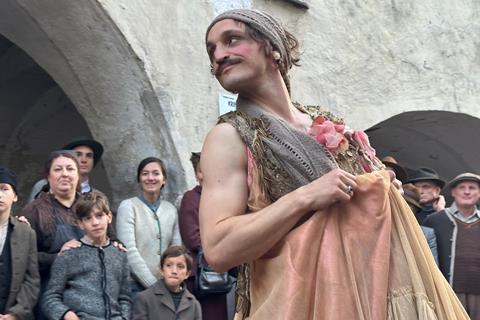Frank Rogowski stars in a meandering drama about Switzerland’s persecution of Yenish children

Dir: Giorgio Diritti. It/Switz. 2023. 179mins
One of the blackest marks in Switzerland’s history is the forced removal of children belonging to the country’s itinerant Yenish community in the mid 20th century. Adapting a 2004 novel set against the background of what was essentially a state-sponsored form of eugenics, Italian director Giorgio Diritti and his regular co-writer Fredo Valla play fast and loose with their original material while still struggling to locate the emotional core of a story that reveals itself, after several meanders, to be the picaresque saga of a difficult, troubled man.
A curious, sometimes intriguing but ultimately frustrating portrait
Versatile German actor Franz Rogowski has been having a quite a year – this his third major festival film billing of 2023 after Disco Boy in Berlin and Passages at Sundance. There is no faulting the intensity he brings to the role of Lubo, a Yenish travelling entertainer who is used and abused by a state that requires him to serve it – as a border guard – while simultaneously doing everything it can to eradicate his culture. It is the script that’s the problem, in an overlong film that, after a tight opening third, breaks into a leisurely lope.
Handsome, crisply-shot period settings and our desire for some kind of narrative closure carry the film through the ramble, but in the end we are left with fragments: anger at an injustice, a vivid character study, a photogenic road trip from Zurich to Lugano and Lake Maggiore. Diritti’s last film, Hidden Away, achieved little international outreach despite the Silver Bear for best actor picked up by its lead, Elio Germano, at the 2020 Berlinale. Outside of its two co-production territories, where it should enjoy a small arthouse run, Lubo may struggle to improve on that record.
The action opens in 1939 and spans 20 years. Lubo is seen first in a bear suit, performing with his family for an audience of shyly amused villagers; when he emerges, he is in partial drag, rouged up but still sporting a prominent moustache. Switzerland’s bureaucratic-military machine soon knocks the fun out of him, when he is called up and sent into the mountains to guard the neutral country’s borders as war looms. Here, two shocks follow in quick succession. The first is a devastating piece of news regarding the wife and children he left behind. The second is something Lubo does in a dark forest that all but overturns the sympathy we feel for him.
It’s a bold move, one made all the more striking by the command of mood and lighting in this wintry Alpine ‘dark night of the soul’ segment of the film. The issue is that it turns Lubo – the central character – into a paradox that is never resolved. Suddenly wealthy after the war in Zurich, he becomes a trader of luxury goods and serial womaniser while attempting to track down his missing kids by posing as a benefactor of Pro Juventate, the Swiss foundation that was responsible for the ‘Kinder der Landstrasse’ (Children of the Street) programme of forced removal of nomadic children from their parents.
Lubo is clearly a man obsessed, corroded by a bitterness that he takes out on the upright burghers (and their wives) of a country that has betrayed him. But as the story trundles inexorably on through Lubo’s love affairs and jail time – even abandoning this troubled hero at one point to take up the narrative point of view of the woman he feels the deepest connection with, hotel chambermaid Elsa (Valentina Belle) – it’s difficult to focus on who or what we’re supposed to care about. Lubo? The kids? Elsa? The latter’s son, who burns the letters Lubo sends Elsa from prison? Rooted in a great injustice, Lubo – the film – becomes a curious, sometimes intriguing but ultimately frustrating portrait of a man undone by that injustice.
Production companies: Indiana Production, Aranciafilm with Rai Cinema, Hugofilm Features, Proxima Milano
International sales: True Colours, sales@truecolours.it
Producers: Fabrizio Donvito, Benedetto Habib, Marco Cohen, Daniel Campos Pavoncelli
Screenplay: Giorgio Diritti, Fredo Valla, based on the book Il Seminatore by Mario Cavatore
Production design: Giancarlo Basili
Editing: Paolo Cottignola, Giorgio Diritti
Cinematography: Benjamin Maier
Music: Marco Biscarini
Main cast: Franz Rogowski, Christophe Sermet, Valentina Belle, Noemi Besedes, Cecilia Steiner, Joel Basman
























